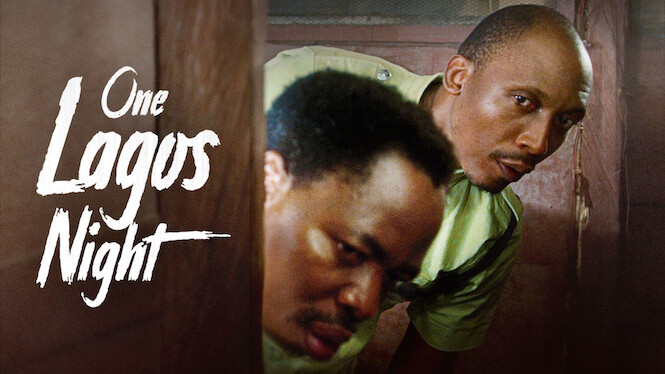One Lagos Night is Nice and Easy
by Adebayo Adegbite Ekene Mekwunye’s “One Lagos Night” is a crime comedy set in Lagos, Nigeria. It follows the story of Ehizogie “Ehiz” Obaseki (Ikponmwosa Gold) and his roommate Tayo (Frank Donga), two down on their luck graduates, who plan to rob Anita (Genoveva Umeh), a rich, young fixer and money launderer. The robbery quickly gets complicated when another gang of robbers with the same idea enter the scene and the pair must use their wits and resources to survive in a battle that could cost them their freedom and possibly their lives. The film has a small cast of mostly relative Nollywood newcomers and upcoming acts. Nollywood veterans like Ali Nuhu and Eniola Badmus also make appearances. The film boasts a lean 103 minutes of runtime and its plot relies on a common trope that has been rehashed many times. But somehow, One Lagos Night still finds ways to be enjoyable. Perhaps what helps is the uncanny decision to keep things short and simple. The film does not make promises that it cannot keep and delivers on all the promises that it makes. More importantly, it bucks the popular trend in Nollywood comedies where directors just pack their movies full with actors who do absolutely nothing. In One Lagos Night, all character motivations are clear, and it is easy to see how they develop organically within the story and how the story itself builds up to its climax. It is perhaps this organic development that makes the story extremely enjoyable and relatable, such that the viewer is drawn into the story and is invested in it. Like a farmer watching his crops or a pet owner watching their pet grow, the viewer is eager to see what happens next. For a comedy, “One Lagos Night” is surprisingly thrilling and suspenseful, such that when the final twist does come, viewers are likely to be thrown off-guard without deeming it an ass pull, thanks to breadcrumbs that are everywhere. The social commentary also adds an extra layer of relevance to the comedy. The character of Tayo, for example, is a sly dig at the average Nigerian’s obsession with religion, such that even when he or she is doing something obviously illegal, he somehow still uses religion to justify it. While Ikponmwosa Gold does not disappoint as Ehiz, the highlight of the movie is no doubt Frank Donga who wears the character of Tayo like a second skin, again proving why he is everybody’s favourite unassuming, unemployed character actor. His character Tayo is a proper foil to Gold’s Ehiz. I am also impressed that the movie does not fall into the uncoordinated slapstick traps that Nollywood comedies often fall into. These often well-intentioned efforts to make the viewers laugh come off as tiring and annoying thus rendering the experience tasteless. Over here, Ehiz and Tayo are just being themselves; two poor and unemployed Nigerians behaving like poor and unemployed Nigerians in dialogue and mannerisms. Their humour feels natural to the viewer because they are embedded in relatable actions and reactions. This naturalness extends to the secondary characters. From Eniola Badmus as Uloma to Ali Nuhu as Radiant , Genoveva Umeh as Anita and Ani Iyoha as Killer, everyone’s here to do their job and nothing more. They are not taking space or padding the stats, they are adding diverse qualities that make for a wholesome experience. One can argue that the film’s runtime is a tad short, thus robbing the characters the chance to develop some more, but the popular maxim comes to mind here: the best storytellers are not just the ones who know how to craft a good narrative, but the ones who know how to stick to the point of that narrative and end it when they know that they have satisfied their audience. Also the irreverent “quotable quotes” that come at various intervals are worthy of mention. The quotes themselves are interesting, but what makes them brilliant in hindsight is that, like the victim of a lighthearted and harmless prank, the viewer attempts to follow the quotes to see how they relate to the film’s plot, but then later realizes that he has been had and that the quotes are just someone goofing around and nothing deep is going on with them. Everything said, the narration by Ehiz is sore thumb worthy of rebuke. It’s largely incoherent and should have been approached with more carefulness. Ehiz is presumably narrating an incident that already happened but it comes out more like commentary on a live event, perhaps because the director is trying to preserve the suspense and that does skewer the story a bit. Also, the attempt at an American accent by Genoveva Umeh’s is lazy and shouldn’t have found a way into the film. Overall “One Lagos Night” is a movie that doesn’t have any delusions of its own grandeur or attempts of its comedic value. It instead sticks to being natural and proving for once that real life doesn’t have to be embellished for it to be funny in fiction. And that is why I highly recommend it.


